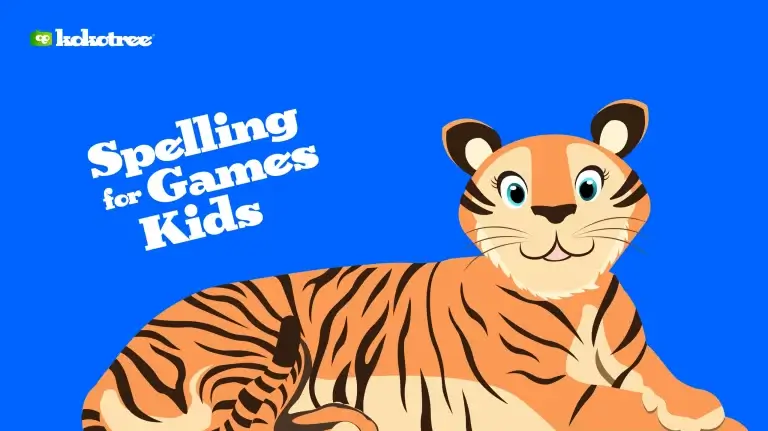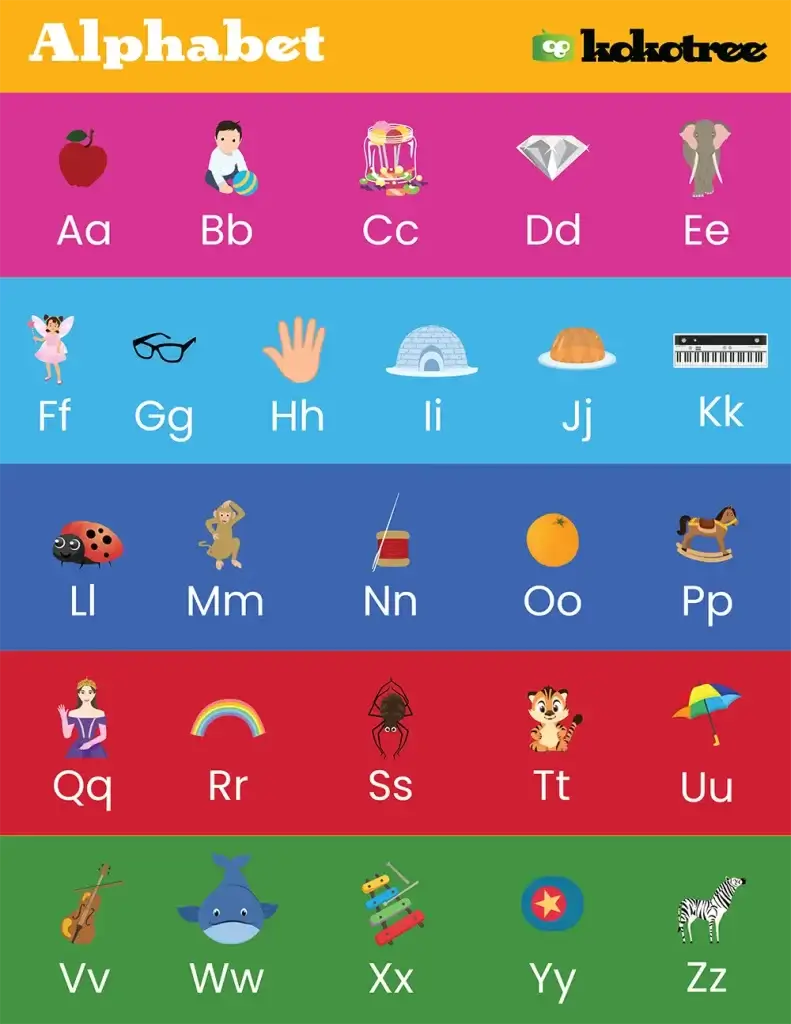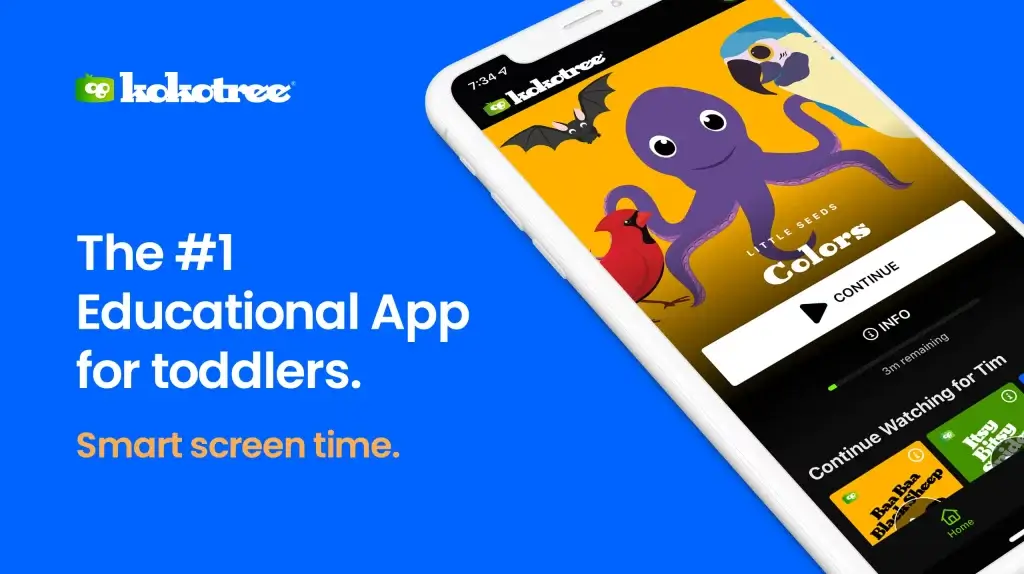

Written by: Kokotree
Updated:

Spelling is an integral part of reading and writing. It helps kids understand word meanings and figure out how to pronounce words. Good spelling skills also make it easier for kids to write clearly and correctly.
But spelling can also help children develop foundational skills for their whole life.
Now that you know why spelling is necessary for kids, let’s discuss how you can help them improve their skills.
For ages 2-6. They watch and play for 20 minutes. You get a break.
⭐ 5,000+ parents get daily breaks with Kokotree.
Try it Free →Works in 30 seconds • No credit card • Cancel anytime
The benefits of playing spelling games are that they can help kids learn new words, practice spelling words they already know, and have fun simultaneously. Spelling games can also help improve memory skills, vocabulary, problem-solving, competitiveness, concentration, stress relief, efficiency, and more.
There are many benefits of playing spelling games, as you can see. Spelling games can help improve your child’s spelling, memory, vocabulary, problem-solving, competitiveness, concentration, stress relief, efficiency, and more.

Spelling is essential to writing, a skill that kids develop over time. There are different stages of spelling development that kids go through as they learn to spell words correctly. Let’s look at the various stages of spelling development and what kids can do to improve their skills.
The precommunicative stage (typically 3+ years to 5+ years) may be thought of as “make-up writing,” with the child imitating writing by copying or inventing random strings of letters and possibly numerals.
In this earliest stage of spelling development, children haven’t yet learned that words are made up of separate units called phonemes. They also don’t know that these phonemes are represented by letters.
During this stage, kids’ spellings are very creative and are based on the shapes and sounds of the words they hear.
For example, a child might spell the word “dog” as “d-o-g,” “dg,” or even “dig.”
In this stage, children realize that words are made up of phonemes. At the semi-phonetic stage (typically 4+ years to 6+ years), the beginnings of a partial mapping of phonetic content words are evident.
Phonemes are the smallest units of sound in a word. They can be represented by letters, but they can also be represented by other symbols, such as numbers or diacritics. For example, the word “cat” has three phonemes: /k/, /æ/, and /t/.
They also start to understand that these phonemes can be represented by letters. As a result, their spellings become more phonetic.
They might spell the word “dog” as “dawg” or “bog” because these are closer to the way the word sounds.
In this stage, children have a good understanding of the relationship between phonemes and letters. Their spellings are quite phonetic.
Children writing in the phonetic stage (typically 5-7 years old) better understand how sounds work. For example, they know that “bark” differs from “ooh.”
They can identify all significant sound tokens within words and use them to spell more complex phrases with less difficulty as time goes on; however, some students never progress past this initial stage because their spelling improves very slowly over time or gets worse before improving again later!
They might spell the word “dog” as “d-o-g” because this is the way it sounds.
Children understand that some words don’t follow phonics rules in this stage. Their spellings are a mix of phonetic and non-phonetic spellings.
In the transitional stage (6+ years to 11), most English spelling is evident and common words are known. This gives way for more reliance on sound representation as opposed to sole support on visually representing language structure which becomes more apparent over time; However, there’s still some use for both tactics because they work best in different situations!
They might spell the word “dog” as “d-o-g” or “dawg” because they are not sure which way is correct.
In this final stage, children have a good understanding of the English spelling system, and their spellings are pretty accurate. This includes dealing with silent vowels, irregular plurals, and words with multiple meanings.
By and large, students now have a wide range of strategies for checking and self-correcting words. They can use these skills with increasing proficiency as they progress through the different stages.
When children reach the correct stage in spelling (typically around 10 or 11 years), almost all aspects seem mastered, thanks mainly to their extensive practice over time. This allows them mastery of even some complex sound-symbol principles by employing various methods such as proofreading oneself when written down notes aren’t enough and looking up unfamiliar words from context if necessary.
For ages 2-6. They watch and play for 20 minutes. You get a break.
⭐ 5,000+ parents get daily breaks with Kokotree.
Try it Free →Works in 30 seconds • No credit card • Cancel anytime
The answer to this question is a bit complicated. In some cases, kids may start to read before they learn how to spell words. This is because reading involves recognizing familiar patterns and familiar texts, while spelling requires a more in-depth knowledge of the individual sounds that make up a word.
However, it is also possible for kids to learn how to spell words before they know to read. This usually happens when kids are first learning how to write. They may be able to spell words correctly but have difficulty reading them back.
Ultimately, there is no right or wrong order in which kids learn these skills. Some kids may learn to read first, while others may learn to spell words first. Either way, both skills are essential for becoming proficient readers and writers.

Get free parenting tips, news, updates, and content from Kokotree.
Spelling games for toddlers and preschoolers can include matching games, where the child matches a word to a picture, or letter tiles, where the child spells a word by placing letter tiles in order.
Other spelling games might involve writing words on a chalkboard or whiteboard or using magnetic letters on a refrigerator door.
Some commercial spelling games are also available, such as Scrabble Jr. or Boggle Jr., specifically designed for younger children. Whatever type of spelling game you choose, make sure it is age-appropriate and that your child enjoys playing it.
There are all sorts of spelling games you can play with toddlers and preschoolers to help them learn their letters and the sounds they make. Many of these games require repetition to help kids learn. Here are a few ideas:
Point out letters when you read to your child in print and in their environment. Please help them to understand that letters make up words and that words have meaning. Start with simple, familiar words and work up to longer, more difficult ones. Encourage your child to spell words aloud, and praise their efforts even if they are not perfect.
is a great game for helping kids to learn how to spell simple words. Write a word on paper, leaving one letter at the end. Ask your child to guess what letter would come next and write it down. As they spell the word correctly, move up to the following letter until the whole word is complete. For example, you might write “sh-” on the first step, “sha-” on the second, and so on.
Flash cards are another simple and effective way to help kids learn to spell words. Write a word on one side of a card and its definition, or a clue about the word, on the other. Please review the cards with your child, testing them on how well they can spell each word.
Make a bingo card using construction paper or cardstock. Cut out small squares and write a letter of the alphabet in each one. Call out letter sounds for your child to find and cover on their bingo card. The first one to cover a whole row, column, or diagonal is the winner!
Write letters of the alphabet in random order on pieces of construction paper or masking tape. Place them on the floor in a hopscotch pattern. Please have your child jump from letter to letter, saying the sound of each one as they go.
Hide index cards with different letters around the house or yard. Give your child a bag or basket to collect them in. Once they have found all the letters, please help them to put them to spell a word or words.
Write different letters of the alphabet on small pieces of paper. Turn them all over and mix them up. Take turns flipping two cards simultaneously, trying to find matching letters. If they match, the player gets to keep the pair and takes another turn. If they don’t match, the cards are turned back over, and it’s the next player’s turn. The game is over when all the pairs have been found, and the player with the most pairs wins!
The game of Hangman is a classic that generations of kids have enjoyed. It is an excellent way for kids to practice spelling words and can be played with one person or in teams.
The game’s object is to guess the unknown word before the man is “hanged.” To do this, players take turns guessing letters in the word.
If the letter is in the word, it is revealed. If not, then a body part is added to the man. The player loses if the man is completed before the word is guessed. The game can be played with any word, from simple words for beginning spellers to more difficult ones for advanced spellers.
However, choosing appropriate words for the players’ age and skill level is essential. Hangman is an excellent game for kids to play at home or in the classroom, and it can be a lot of fun while helping kids to improve their spelling skills.
In this game, kids have to unscramble a series of jumbled-up words. This is an excellent way for kids to practice spelling words, as well as practicing their problem-solving skills.
To play, write a list of words on separate pieces of paper and then scramble them up. Kids can then take turns trying to unscramble the words. The first person to unscramble all of the words wins the game.
This game can be played with any word, and it can be adjusted to make it more or less difficult, depending on the age and skill level of the players. Word Scramble is an excellent way for kids to have fun while practicing their spelling skills.
A spelling bee is a competition in which contestants are given the word and have to spell it correctly.
This is an excellent game for kids to play in the classroom or at home, and it can be a lot of fun while helping kids to improve their spelling skills.
To play, write a list of words on separate pieces of paper and then have the kids take turns trying to spell them correctly. The first person to spell all of the words correctly wins the game.
Memory is a classic game that can be played with any words.
To play, write a list of words on separate pieces of paper and then shuffle them up. Place them all face down in a grid. Players flip over two cards simultaneously, trying to find matching pairs.
If the cards match, the player keeps the pair and takes another turn. If they don’t match, the cards are turned back over, becoming the next player’s turn. The game is over when all of the words have been matched.
A word ladder is a game in which players take turns changing one letter of a word to make a new word.
For example, the word “cat” could become the word “hat” by changing the “c” to an “h”. Then, the word “hat” could become the word “hit” by changing the “a” to an “i”. This game is an excellent way for kids to practice their spelling skills.
To play, write a list of words on separate pieces of paper and then have the kids take turns changing one letter to make a new word. The first person to change all of the words wins the game.
A crossword puzzle is an excellent way for kids to practice their spelling skills.
To play, create a crossword puzzle with words that the kids are trying to learn. The clues for the words can be definitions, synonyms, or anything else that will help the kids to spell the word correctly.
The game is won when all of the words have been spelled correctly.
Hangman, Word Scramble, Spelling Bee, Memory, Word Ladder, Crossword Puzzle. These are all great games for kids to play to help them improve their spelling skills. Choose a game appropriate for the player’s age and skill level, and have fun!
Here are a few tips for playing spelling games with toddlers and preschoolers:
Also be sure to check out our article Educational Games for Preschoolers (No Phone Required) for more game ideas for preschoolers and toddlers.
There is no one-size-fits-all answer to this question, as the best age for kids to start playing spelling games will vary depending on the individual child.
However, some parents may start their children playing spelling games as early as kindergarten, while others may wait until the child is a little older, such as first or second grade.
While you don’t want to start spelling lessons too early, you also don’t want to wait too long to begin instruction. Some educational programs recommend that parents wait until their child is in third grade before beginning spelling lessons. You might want to try other techniques to help make your child smarter, as detailed in this article.
However, assuming your child can read at a basic level, this is much too long to wait. There are several reasons why it is essential to start teaching spelling by the end of first grade, or earlier if possible.
First, you don’t want your child to develop bad habits by guessing how to spell words. Learning something correctly the first time is much easier than trying to fix bad habits later on.
Additionally, it is essential to teach spelling before your child needs it for other subjects in school. By starting instruction early, you can help your child gain confidence and skills that will be essential later on.
Finally, gaining skills and confidence early in their school career will help prevent your child from internalizing the idea that they “just aren’t good at spelling.” Ideally, parents should start teaching spelling by the end of first grade or as soon as their child is interested in learning.
Yes, educational apps can help teach kids spelling and reading. Many different apps can help kids learn to read and spell words correctly. Some apps are designed for toddlers and preschoolers, while others are meant for older students.
Parents should choose an appropriate app for their child’s age and skill level. The app should also be fun and engaging, so the child will enjoy using it. Finally, parents should ensure the app is providing their child with a challenge appropriate for their level.

Kokotree is an learning app for toddlers that helps your child learn basic academic concepts like numbers, shapes, colors, the alphabet, and more.
Kokotree for kids ages 1 to 5. It’s perfect for busy parents who want to give their toddler or preschooler a head start on their education.
Instead of passively watching cartoons, your child will be engaged in active, smart screen time—through educational videos that improve their cognitive development.
With Kokotree, your child will learn:
No credit card required.
Not quite ready yet? Learn more about Kokotree



